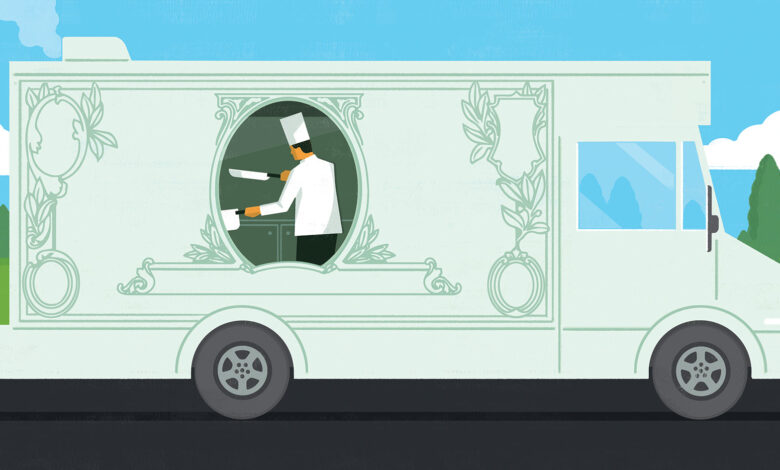13 Innovative Food Business Concepts to Kickstart Today (2025)

While tastes may vary from person to person, one thing remains constant: everyone needs to eat. With a wide range of potential customers and products available, the food market always has room for new entrants. If you’re a first-time merchant looking to enter the food business, consider downloading this startup checklist or exploring the ideas below.
13 food business ideas to launch today
- Food truck
- Ice cream shop
- Cooking classes
- Personal chef
- Coffee shop
- Meal kits
- Baked goods
- Sauces
- Prepackaged snacks
- Baby food
- Homemade jams and jellies
- Organic foods
- Wine, beer, and spirits
Each food business idea has its own set of advantages and disadvantages, so it’s important to consider what you can commit to and choose the idea that best suits you. Here are 13 ideas for products and services to inspire you.
1. Food truck
Food trucks are a popular option in the food business. The global food truck market is growing at a rate of 6.2% per year, offering chefs the chance to create unique menus with the added benefit of mobility.
Bringing the restaurant directly to customers can help overcome the challenge of attracting customers to a physical location.
Benefits
- Mobility: Food trucks allow entrepreneurs to reach customers wherever they are, from downtown areas to parks and beaches.
- Creative control: Food truck owners can create unique menus at a lower cost compared to owning a restaurant.
Challenges
- Legal hurdles: Zoning laws and health department codes can vary by location, so it’s important to research and comply with regulations in each area where you plan to operate.
Get inspired: The Cheese Bar’s Journey From Food Truck to Seven Figures and Multichannel Success
2. Ice cream shop
Ice cream is a beloved dessert worldwide and a profitable food business idea. The ice cream industry is expected to reach $112 billion by 2030, offering a variety of styles and flavors to cater to different tastes.
Ice cream can be served alongside other desserts and offers endless recipe possibilities, making it ideal for niche markets.
Benefits
- Creative control: Ice cream allows for endless flavor combinations, appealing to innovative entrepreneurs.
Challenges
- Seasonal fluctuations: While ice cream sales peak in summer, they may slow down in winter. Offering seasonal varieties can help maintain sales year-round.
Get inspired: How These 4 Pop-Up Shops Went Viral (And How Yours Can Too)
3. Cooking classes
Cooking classes offer a hands-on approach to the food business, providing a rewarding experience for both teachers and students. Classes can be offered online or in-person, live or pre-recorded, catering to different preferences.
Teaching cooking is a great way to enhance skills, build relationships, and explore various teaching formats.
Benefits
- Scalability: A single cooking class can evolve into a franchised brand or digital platform, offering additional products and services to students.
Challenges
- Exposure: Promoting cooking classes requires a personal presence, which may be challenging for introverted business owners seeking distance between their brand and personal life.
Get inspired: This 84-Year-Old Grandmother Serves Comfort and Community Through Livestreamed Cooking Classes
4. Personal chef
Becoming a personal chef offers the opportunity to build personal relationships with clients, similar to sales. Personal chefs are hired to create customized meals for clients with special dietary needs or preferences, offering a unique culinary experience at home.
For those seeking a personalized approach in the food business, becoming a personal chef can be a rewarding and fulfilling career choice.
Individuals, families, caterers, or special events can all benefit from employing personal chefs.
Popular dessert sauces include custard, butterscotch, hot fudge, and fruit-flavored sauces.
Benefits
- Customer loyalty: Sauces are versatile and can be used in many dishes, leading to repeat purchases and customer loyalty.
- Adventurous clientele: New customers are often willing to try unique sauce brands, especially those with distinctive branding.
Challenges
- Getting the right taste: Balancing unique flavors with familiar tastes can be a challenge for sauce producers.
Heartbeat Hot Sauce, based in Thunder Bay, Ontario, offers a range of hot sauces with unique flavor combinations like pineapple and blueberry habanero. The brand’s online presence on Instagram helps maintain a strong relationship with its community.
Get inspired: How Heatonist Became the World’s Top Hot Sauce Website
9. Prepackaged snacks
Prepackaged snacks like chips, nuts, pretzels, and popcorn are a popular choice for outdoor excursions and late-night cravings. The market for savory snacks in North America is expected to reach $71 billion in 2025, providing opportunities for new merchants with unique products.
Benefits
- Wide product variety: Prepackaged snacks offer a range of food and flavor options, allowing brands to differentiate themselves with unique packaging.
Challenges
- Competing with large brands: Established snack-food brands present a challenge for new merchants looking to stand out in the market.
The Snaffling Pig, based in the United Kingdom, specializes in pork crackling and other prepackaged snacks. The brand’s nostalgic branding aims to recreate the flavors of casual pub food, appealing to a sense of camaraderie with customers.
10. Baby food
Baby food is a popular market segment, with growing potential for new merchants. Fragola, based in Innisfil, Ontario, offers a range of baby food products with an emphasis on nutrition and freshness. Building trust with parents is crucial for new brands entering the competitive baby food market.
11. Homemade jams and jellies
Homemade jams and jellies are a low-cost business idea that allows entrepreneurs to grow their own fresh produce. Fruits of the Forage, a UK-based retailer, focuses on fresh preserves made from local produce, setting itself apart from larger competitors.
12. Organic foods
Organic foods, produced using natural fertilizers instead of chemical pesticides, have seen increased popularity due to concerns about pesticide safety. Organic food producers prioritize ecological balance and sustainability, catering to customers seeking healthier options.
Consider selling raw, organic produce or incorporating organic ingredients into your food products. This can help establish a fresh branding and appeal to customers who value organic products. However, sourcing organically grown ingredients may pose a challenge.
Starting a Food Business: A Guide for Foodies and At-Home Chefs
Best food business ideas FAQ
Which food business is most profitable?
Any food business can have a high profit margin, but if you’re looking for a low-cost, low-risk food business idea with no overhead, check out our dropshipping guide. Dropshipping is a business model that allows entrepreneurs to start an online business and sell products while working with a third party that manufactures, stores, and ships your items directly to your customers.
What is the best food business to start?
There’s no best business for everyone, but on an individual level, it’s best to start a food business you’re passionate about—even if you might not have a high level of experience. New skills can be learned and experience will come with time, but a founder’s passion for their business is crucial to success. Pick the type of business that excites you the most.
What food can I sell to make money?
Any food can make money, but if you’re unsure if your idea has legs, it’s best to validate your product ideas by meeting directly with potential customers, addressing their pain points, and researching the audience around your product to see if there’s potential.
What’s the bestselling food?
Different foods sell for different reasons, but the bestselling ones usually either address a common pain point (such as Katz Gluten Free, in the above example) or appeal to customers by combining familiar favorites with an intriguing novelty (such as Sugar + Spoon’s cookie dough cones).
Starting a Food Business: Pursue Your Passion and Profit
For food enthusiasts and culinary experts, launching a food business provides a unique opportunity to turn your love for cooking into a lucrative venture. Whether you’re a home chef or a dedicated foodie, starting a food business allows you to monetize your passion and share your delicious creations with a wider audience.
Why Start a Food Business?
Starting a food business is not just about making money; it’s about doing what you love and sharing your culinary talents with others. By turning your passion for food into a business, you can create a sustainable source of income while pursuing your creative interests.
Key Steps to Launching a Successful Food Business
- Identify your niche and target audience.
- Create a unique selling proposition for your products.
- Develop a solid business plan and budget.
- Ensure compliance with food safety regulations and licensing requirements.
- Market your products effectively to reach your target customers.
FAQs About Starting a Food Business
1. Which food business is most profitable?
Any food business can be profitable, but consider exploring low-cost, low-risk options like dropshipping to minimize overhead costs.
2. What is the best food business to start?
Start a food business that aligns with your passion and interests, as your enthusiasm will drive your success in the long run.
3. What food can I sell to make money?
Validate your product ideas by understanding your target market’s needs and preferences, and offer a unique solution to address their pain points.
4. What’s the bestselling food?
The best-selling foods often cater to common needs or offer a unique twist on familiar favorites, attracting customers with their innovative approach.
5. How can I market my food business effectively?
Utilize social media, food blogs, and local events to promote your products, engage with customers, and build a loyal following for your food business.
given sentence:
The cat sat lazily in the sun, blinking its eyes contentedly.
Rewritten sentence:
Contentedly blinking its eyes, the cat lazily sat in the sun.



